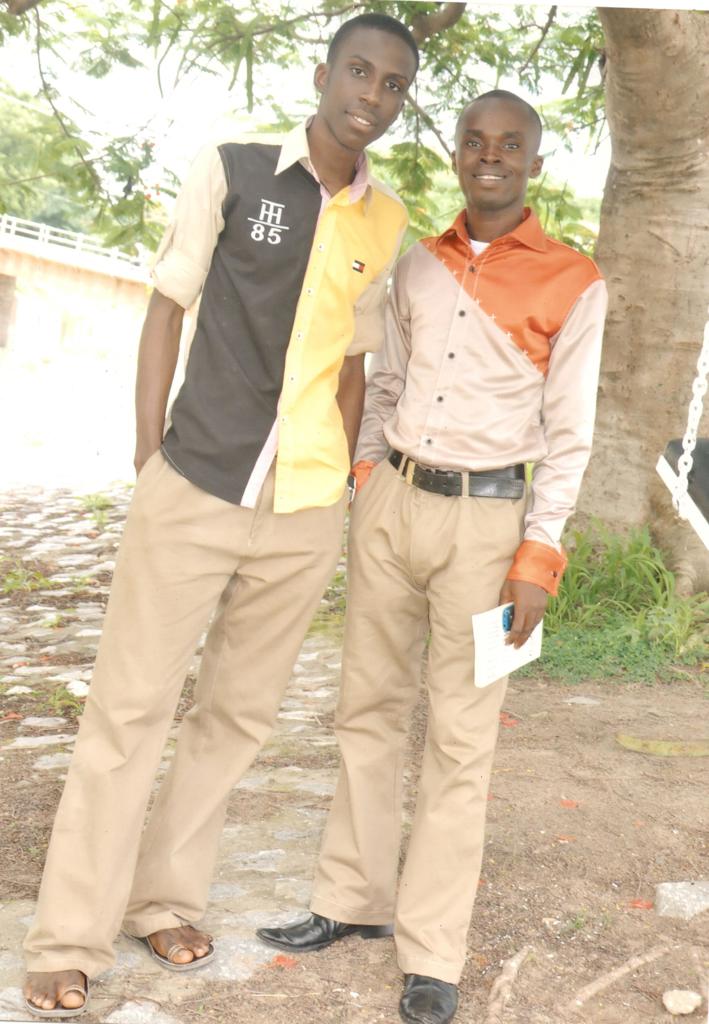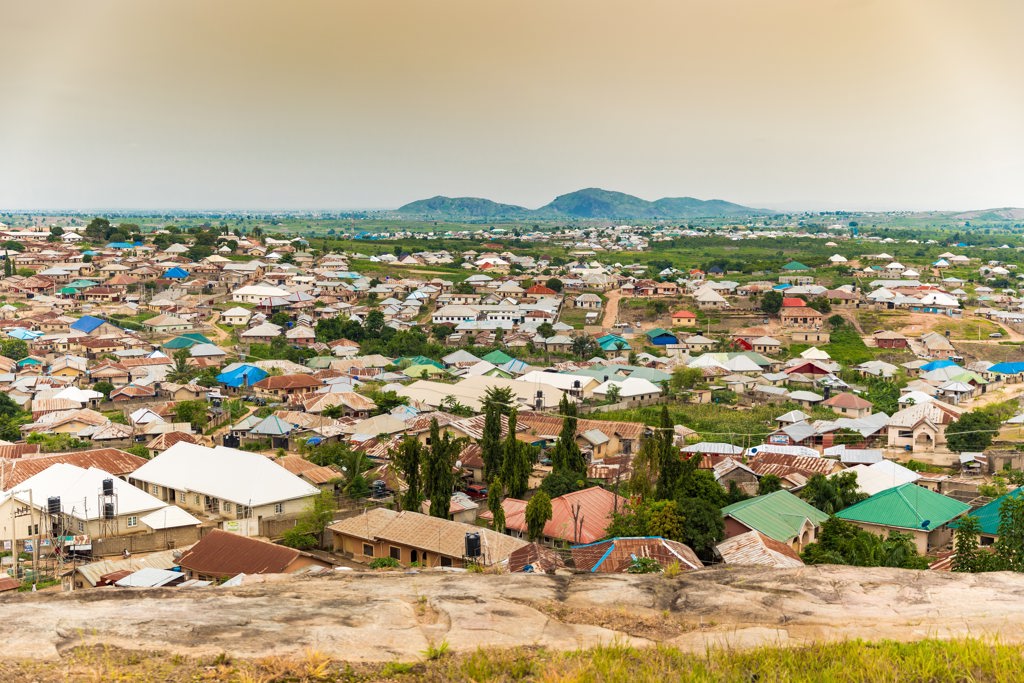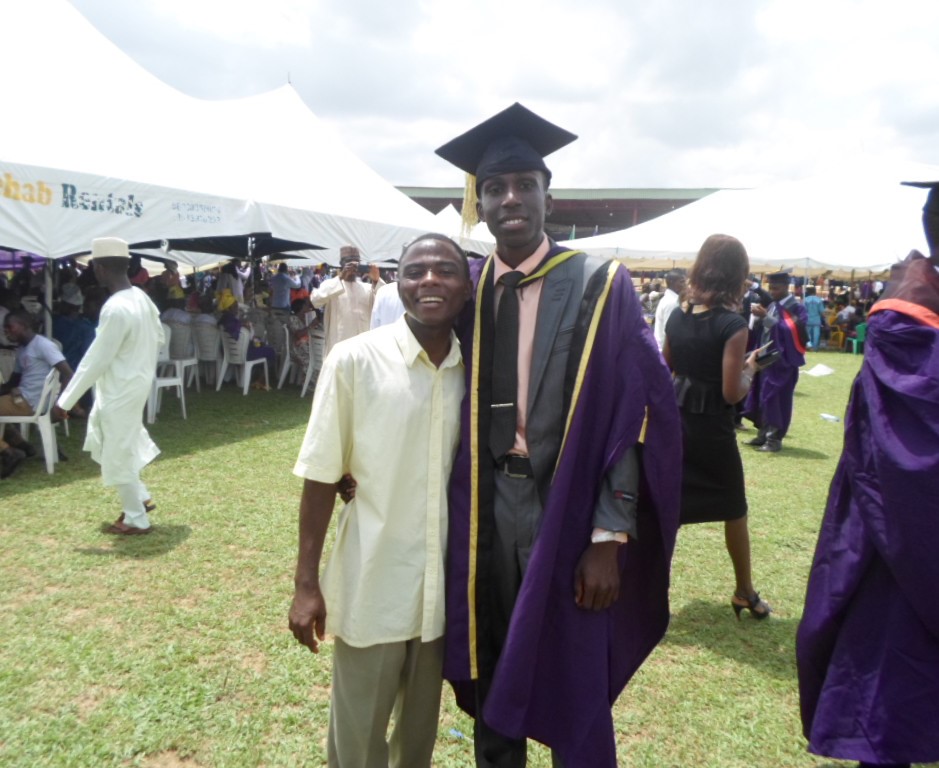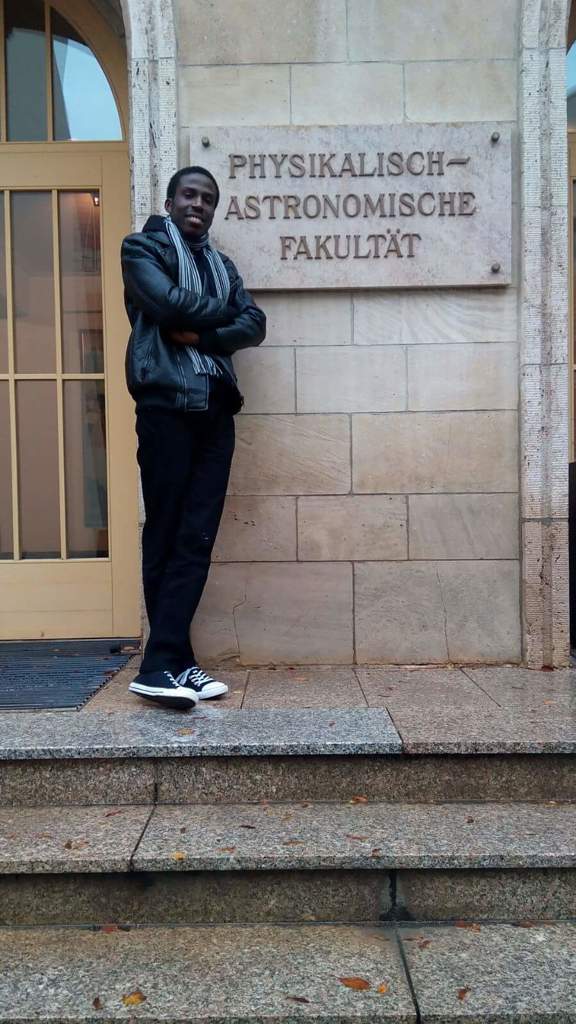Survivor
About
30 January 2023
Survivor
How a young Nigerian survived sectarian violence and found beauty and hope in optical physics.

Timothy Imogore as an undergraduate studying at the Federal University of Technology, Minna, Nigeria.
Like university students across the world, Timothy Imogore traveled home during a mid-term break in 2013 to visit his family and enjoy some much-missed home cooking. The long, tiring journey was nearly the last one he would ever take.
Boarding his second bus of the day, he found a prime seat at the front, put in his earphones, and began to drift off to his music. Just as the last seats were taken, a mother carrying her baby stepped on. The driver offered her a loose wooden chair by the luggage, but she refused to take the uncomfortable seat. Turning to the passengers, the driver asked, “Who will let this woman and her baby sit down?” Having spent the previous bus ride on a similar hard, rickety chair, Imogore was reluctant to move. Then he had an overwhelming feeling of compassion. “I don’t know what came over me. It was like God spoke. I thought, ‘Would I want her to sit on that chair if this was my sister and her child?’ So I moved.”
Soon after Imogore took the terrible seat, he was so tired that he fell asleep. Then a deafening noise and a massive impact shocked him awake. “I woke up spinning. The bus was doing ‘donut rings.’” Timothy’s bus had been ripped in two after a speeding car plowed into it at a crossroads. “One moment I was listening to my music, the next I was whirling around. I jumped off the bus and found that many people perished, but both the driver and I were unharmed. Sadly, the woman was seriously injured and her baby was instantly killed. That would have been me if I had not moved out of that seat.” An acute pain hit him in the chest. “I fell to the ground with a mixture of guilt, anger and emotion. An incredible gratitude came over me. This was a turning point in my life that profoundly strengthened my faith. I felt like I had been given a new life, and I decided to make it count by having a positive impact on the lives of others.”
This was not Imogore’s only near-death experience. Since childhood, he lived with the threat of sectarian violence in northern Nigeria. While he was born in the north, the fact that his family came from the Christian south is how he was defined. “Nigeria has a particular perception of where you come from. It’s not necessarily where you’re born but where your great, great, great grandfather comes from. It’s how your name sounds. How you dress. To some extent, the religion you practice can define the perception of where you originate. It may define how people accept you.”
When Imogore was seven, his family moved to Zamfara State where religious tensions were particularly high. “As a young Christian moving to Gusau, a town with an overwhelmingly Muslim population, it was a big change. It was a brutal and tense environment, but I have many happy memories and still love this place. I love the people. It’s my home. I remember the food, walking through the streets and speaking the language. It’s a very beautiful village. But I was a minority.”
In 2000, when Imogore was nine, Zamfara was the first state to declare Sharia law. Later 11 other states followed suit. “Hostility came with the declaration. It made Zamfara look like an Islamic state. There are lots of wonderful supportive Muslims, but after Sharia law, sectarian violence erupted which led to the death of over twenty thousand people. People were scared and fled the state; nobody wanted to invest in the country.”
"In my opinion, education is key. You see people of all cultures and backgrounds integrate when you go to a high-educational setting like a university."
Getting an education was difficult amid the chaos. “The religious intolerance led to riots and massacres. Imagine being a kid in a school and hearing gunshots outside. It was terrible. I remember being told to keep quiet and remain still. We were so silent I heard the movement of ants. It was dead serious.” Imogore sometimes saw bodies on the streets outside his school. “This was traumatizing. Seeing death, not as an adult, but as a child. This is what we had to go through because of religious beliefs.”
Despite this trauma, Imogore saw education as a way to build a better future for himself and his country. “In Nigeria, there is no integration of cultures. It doesn’t happen. In my opinion, education is key. You see people of all cultures and backgrounds integrate when you go to a high-educational setting like a university. Education breaks down walls. In society, there was diversity but no integration. In academic settings, there are very high levels of intellectual insight. That’s what education does; it pushes diversity.”
Many in his family wanted Imogore to follow in his father’s footsteps and study medicine. Timothy had a different interest. “As a kid I wanted to see lasers and use them as a lightsaber like the Jedi in Star Wars. That was what first sparked my love of physics. But there were no places in Nigeria that would employ a physicist. It was a dead end.” His father encouraged him. “My dad said, ‘Timothy, in life, you have to follow your passion.’ So in 2008, Imogore secured a place to study physics at the Federal University of Technology, Minna, in Northern Nigeria. The start of his university life was relatively safe. But then, in his third year, the 2011 presidential election led to more violence. Protests broke out across 12 Northern states and turned into violent riots that led to 800 killings and more than 65,000 displaced people over three days.
Amid this violence, Imogore and his older sister were traveling home to see their parents for a short holiday. “We were the only ones on the bus of a different religion. It was obvious we looked and sounded different. Our driver received a message from another bus further ahead that buses on the route were being stopped, and passengers were being picked out and killed.” The driver announced that he might have to turn around and drive away from the checkpoint. The passengers were indignant. “Everyone on the bus said ‘No! We want to get to our destination. Let them take their chances.’ They wished that we should be turned over to the gangs and killed. What could we do? There were just two of us versus eighteen other people. I felt fear, confusion and panic. I had a feeling of disappointment with everything and everyone around me. Then I felt anger and rage: people who didn’t even know me wanted me to disappear. They wanted me dead. Then I felt pity. I realized there’s something really wrong with the person who chooses hate.” Suddenly a woman with a child took Imogore’s side. “I was grateful that woman stood up and said, ‘you don’t kill the children of someone else.’” Ignoring the complaints of the other passengers, the driver turned the bus around.
"I felt anger and rage: people who didn't even know me wanted me dead. Then I felt pity. I realized there's something really wrong with the person who chooses hate."
“I often wonder what would have happened if that driver had not been a reasonable, kind man. But he drove us back to safety. I looked out of the window as we passed a town and saw it had been ravaged by violence.” Imogore nearly gave up hope. “Seeing such bad feelings towards my sister and me was demoralizing. I didn’t feel safe. I asked myself ‘Is there ever going to be a time when people don’t take this terrible path? Growing up in this situation teaches you one thing: you must be stronger than your emotions. In the face of any catastrophe, you tell yourself there’s a bright future. You tell yourself, ‘Hey, this is not the time for this right now; you have to focus and get things done.’”
Imogore studied hard for another three years pursuing his dream of becoming a physicist, eventually winning an Abbe School of Photonics scholarship. He set out for Friedrich Schiller University Jena in Germany and experienced liberty like never before. “I fell in love with Jena. The religious freedom in Germany was a really beautiful thing. The absence of religious and gender segregation and discrimination was a breath of fresh air. You could literally smell the freedom. The presence of safety and security and value for human life was comforting and soothing. Jena was known as the city of light, a place whose history is connected to optics and photonics. That alone was captivating.” The Abbe School of Photonics provided him with all he needed to settle in and integrate into Jena during the first weeks. “I was offered free German language courses and provided with a mentor, Michael Mueller, who saw me through the registration and assimilation processes.”
Imogore is grateful that he can pursue his career in Germany. “I often think that my work would not be possible without the kind people who stood up for me on that bus years ago.” Today Imogore is improving the speed of superfast lasers and inscription techniques that send pulses of light in tiny fractions of a second. His work involves developing novel fiber Bragg gratings and processes using femtosecond laser pulses for advanced dispersion control. The technology he is building is crucial to the communication network that brings the world together and connects people and cultures for those not fortunate enough to travel themselves. His dedication to advancing science for all of humanity is core to his philosophy. “Science teaches you to focus on your little task for the collective good of the entire universe. You might not know it, but what you did ten years ago might be instrumental in solving a problem in fifty years’ time. I’m doing a little thing in my Ph.D. that will contribute to the collective group.”
"My vision is to see the potential of young Africans put to use to make the African continent a key player not just in optics and photonics but in other "high-tech fields."
Imogore is also committed to giving back by advancing optics and photonics in Africa. “I am passionate about bringing young Africans into optics and photonics. Africa has the potential to be an optics and photonics powerhouse like the United States and Germany. My vision is to see the potential of young Africans put to use to make the African continent a key player not just in optics and photonics but in other high-tech fields.” Imogore is finding ways to achieve his vision, including serving on Optica’s Diversity, Equity and Inclusion Rapid Action Committee. “I felt honored to be offered this opportunity to contribute to the optics and photonics community. This is my passion – advancing the progress of my home country and continent through optics and photonics by tapping the potential of others like me.”
The Optica Community unites a diverse, global population of students, scientists, engineers and professionals. We invite everyone in our community to forge the connections vital to solving societal challenges through light science and technology.
Media Contact



.jpg)
